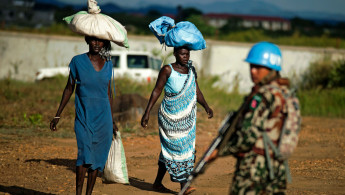UN eyes further drawdown of Darfur peacekeeping mission
The United Nations is planning to press on with a major drawdown of its joint peacekeeping mission with the African Union in Sudan's Darfur region, the UN peacekeeping chief said on Monday.
The Security Council agreed last year to trim the UNAMID mission - once among the biggest and costliest of all peace operations - as the United States pressed for budget cuts to peacekeeping.
UN peacekeeping chief Jean-Pierre Lacroix said the latest plan calls for the number of troops to be reduced from 8,735 to 4,050 by June 2019 while cutting the police force to 1,870 from its current level of 2,500.
"The situation in Darfur has changed dramatically for the better since the height of the conflict," Lacroix told the council.
UN peacekeepers will now focus their efforts on the Jebel Marra area, where fighting continues between Sudanese government forces and rebel groups.
The council is scheduled to vote on June 28 on the latest proposed cuts to UNAMID when it renews the mandate of peacekeeping force.
The conflict in Darfur erupted in 2003 when rebels took up arms against Sudan's government, accusing it of marginalisation.
In recent years, the level of violence has significantly dropped across Darfur, with Khartoum insisting that the conflict has ended in the region.
Deployed in 2007, UNAMID once had 16,000 blue helmets on the ground tasked with protecting civilians.
Last year, the council agreed to a two-stage drawdown that reduced the number of troops from 13,000 to 11,400 and then to 8,735 by the end of June this year.
The number of police dropped from 3,150 to 2,888 by January and 2,500 by June.
The United Nations says that over the years the conflict has killed about 300,000 people and displaced more than 2.5 million, with many having set up home over the last decade and a half in sprawling semi-permanent camps.





 Follow the Middle East's top stories in English at The New Arab on Google News
Follow the Middle East's top stories in English at The New Arab on Google News

![Israeli forces ordered bombed Gaza's Jabalia, ordering residents to leave [Getty]](/sites/default/files/styles/image_330x185/public/2176418030.jpeg?h=a5f2f23a&itok=_YGZaP1z)
